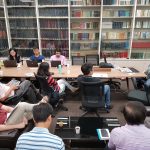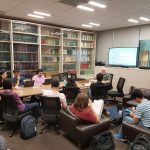Julien Dutant, King’s College London, “Safety for Credences” (10:15am-11:35am)
The distinctions between belief, true belief, justified belief and knowledge are well-established in the epistemology of full beliefs. It is still an open question, however, whether there are analogue categories for credences. In this paper I spell out an account according to which there are. The starting point is Tang’s (2016) and Pettigrew’s (ms) theory of reliable and justified credence. Put roughly, they hold that one’s credence in a proposition is reliable or justified iff it matches the objective probability of that proposition given one’s evidence. I argue that the account faces an analogue of the missed cues problem for Lewis’s account of knowledge for full belief (Schaffer 2001): it allows credences that accidentally match the relevant objective probability to count as reliable or justified. In the full belief case, a good solution to Lewis’ is to replace his evidentialist condition with a safety one. I spell out an analogue strategy for the case of credences. The key idea is to use Tang’s (2016) and Pettigrew’s (ms) as an analogue of truth for credences. The resulting account guarantees that knowledgeable credences are probabilistically consistent and allows one’s probabilistic knowledge to be imprecise. Finally, I sketch one way to extend the account to justification for credences, extending ideas from Smith (2016).
Abelard Podgorski, NUS, “Skepticism about Propositional and Doxastic Justification” (2:00pm-3:00pm)
One common story about epistemic rationality goes something like this: for each agent, at each time, there is some doxastic attitude towards P that is propositionally justified for them. In order to be rational, the agent must hold the attitudes that are propositionally justified for them, and in addition, they have to be doxastically justified in holding those attitudes, which is a matter of them actually holding the attitude on the basis of the epistemic reasons that support it. In this talk, I want to distinguish the basic commitments of this picture, and raise doubts about one in particular that has not received much attention: that we can identify, in a principled way a reasons base for each agent which determines what is propositionally justified for them. I will try to argue that there is no way to identify such a base without appealing to the things that propositional justification is supposed to explain or else severing the connection between doxastic justification and rationality. One potential response to the problem would be to try and reverse the direction of explanation between propositional and doxastic justification; I will propose something a little more radical – that neither propositional nor doxastic justification has any significant role to play in explaining the rationality of agents.
Bob Beddor, NUS, “Reliabilism, Reasons, and Defeat” (3.10pm to 4.10pm)
Reliabilism purports to explain justification in entirely naturalistic terms. One challenge to this reductive goal comes from cases of defeat. In order to avoid counterexamples, reliabilists need to invoke a “No Defeaters” clause. However, it proves difficult to formulate a satisfactory No Defeaters clause without smuggling in unreduced epistemic notions. After criticizing extant reliabilist strategies for handling defeat, I propose a solution. My solution is to integrate reliabilism with Pollock’s influential reasons-based approach to justification and defeat. The resulting view is a sort of “Reasons First Reliabilism”. Justification and defeat are explained in terms of reasons to believe, and reasons to believe are then analyzed along reliabilist lines.
Weng Hong Tang, NUS, “Evidentialism and Fit” (4.20pm to 5.20pm)
According to evidentialists, we have justification for a belief—whether binary or partial—if and only if our evidence fits the belief. But surprisingly little has been said about the notion of fit. In this talk, I’ll consider some attempts to cash out the notion. The first attempt involves an appeal to epistemic probability. The second attempt, favoured by Feldman and Conee, as well as McCain, involves an appeal to inference to the best explanation. The third attempt involves an appeal to a match between belief content and the content of one’s evidence. I’ll argue that all three attempts fail to satisfy certain desiderata that an account of fit should satisfy. In particular, either (i) they are unilluminating, or (ii) they fail to account for inferential justification, or (iii) they fail to account for ultima facie justification, or (iv) they fail to account for the justification of partial belief.
All are welcome






